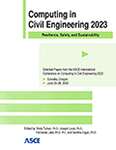Enhancing the Time Efficiency of Personal Protective Equipment (PPE) Detection in Real Implementations Using Edge Computing
Publication: Computing in Civil Engineering 2023
ABSTRACT
Multiple studies have investigated the use of computer vision to enhance construction workers' safety by detecting personal protective equipment (PPE). However, implementing smart and automated PPE detection in near real time in real practices is still a significant challenge. The performance of PPE detection (e.g., accuracy) in near real-time implementations (i.e., time efficiency) has not been adequately studied to date. Thus, this study proposed an edge computing-based method for detecting PPE gloves in near real time, which can enhance workers' safety and protect data privacy. This study used transfer learning methods to monitor PPE compliance and edge computing to improve time efficiency and protect data privacy. Both edge computing-based and cloud computing-based methods were examined and compared pertaining to time efficiency. The results demonstrated how the developed edge computing-based method can improve safety glove detection in a more time-efficient manner while also maintaining data privacy.
Get full access to this article
View all available purchase options and get full access to this chapter.
REFERENCES
Ammad, S., Alaloul, W. S., Saad, S., and Qureshi, A. H. (2021). “Personal protective equipment (PPE) usage in construction projects: A scientometric approach.” Journal of Building Engineering, 35(102086), 1–18.
Baugh, L. (2020). “A New Year of Hand Safety.”, <https://ohsonline.com/Articles/2020/02/01/A-New-Year-of-Hand Safety.aspx?Page=1>, (March 06,2023).
Bello, S., Oyedele, L., Akinade, O., Bilal, M., Delgado, J., Akanbi, L., Ajayi, O., and Owolabi, H. (2021). “Cloud computing in construction industry: Use cases, benefits, and challenges.” Automation in Construction, 122(103441), 1–18.
Cao, K., Liu, Y., Meng, G., and Sun, Q. (2020). “An Overview on Edge Computing Research.” IEEE Access, 8, 85714–85728.
Chen, K. (2020). “Enhancing construction safety management through edge computing: Framework and scenarios.” Journal of Information Technology in Construction, 25(25), 438–451.
Chen, S., and Demachi, K. (2021). “Towards on-site hazards identification of improper use of personal protective equipment using deep learning-based geometric relationships and hierarchical scene graph.” Automation in Construction, 125(103619), 1–14.
El Kafhali, S., el Mir, I., and Hanini, M. (2022). “Security Threats, Defense Mechanisms, Challenges, and Future Directions in Cloud Computing.” Archives of Computational Methods in Engineering, 29(1), 223–246.
Fang, Q., Li, H., Luo, X., Ding, L., Luo, H., Rose, T. M., and An, W. (2018a). “Detecting non-hardhat-use by a deep learning method from far-field surveillance videos.” Automation in Construction, 85, 1–9.
Fang, W., Ding, L., Zhong, B., Love, P. E. D., and Luo, H. (2018b). “Automated detection of workers and heavy equipment on construction sites: A convolutional neural network approach.” Advanced Engineering Informatics, 37, 139–149.
Gugssa, M., Gurbuz, A., Wang, J., Ma, J., and Bourgouin, J. (2022). “PPE-Glove Detection for Construction Safety Enhancement Based on Transfer Learning.” Computing in Civil Engineering 2021, 58–65.
Kochovski, P., and Stankovski, V. (2018). “Supporting smart construction with dependable edge computing infrastructures and applications.” Automation in Construction, 85, 182–192.
Nath, N., Behzadan, A., and Paal, S. (2020). “Deep learning for site safety: Real-time detection of personal protective equipment.” Automation in Construction, 112(103085), 1–20.
Park, M., Elsafty, N., and Zhu, Z. (2015). “Hardhat-Wearing Detection for Enhancing On-Site Safety of Construction Workers.” Journal of Construction Engineering and Management, 141(9), 1–16.
Saini, D. K., Kumar, K., and Gupta, P. (2022). “Security Issues in IoT and Cloud Computing Service Models with Suggested Solutions.” Security and Communication Networks, Hindawi Limited, 2022, 1–9.
Satyanarayanan, M. (2017). “The emergence of edge computing.” Computer, 50(1), 30–39.
Seo, J., Han, S., Lee, S., and Kim, H. (2015). “Computer vision techniques for construction safety and health monitoring.” Advanced Engineering Informatics, 29(2), 239–251.
Varghese, B., Wang, N., Barbhuiya, S., Kilpatrick, P., and Nikolopoulos, D. (2016). “Challenges and opportunities in edge computing.” 2016 IEEE international conference on smart cloud (SmartCloud), 20–26.
US Bureau of labor statistics. (2021). “Injuries, Illnesses, and Fatalities.” <https://www.bls.gov/iif/nonfatal-injuries-and-illnesses-tables.htm>, (March 06, 2023).
Wang, F., Zhang, M., Wang, X., Ma, X., and Liu, J. (2020). “Deep Learning for Edge Computing Applications: A State-of-the-Art Survey.” IEEE Access, 8, 58322–58336.
Weimer, D., Scholz-Reiter, B., and Shpitalni, M. (2016). “Design of deep convolutional neural network architectures for automated feature extraction in industrial inspection.” CIRP Annals - Manufacturing Technology, 65(1), 417–420.
Wu, B., Iandola, F., Jin, P., and Keutzer, K. (2017). SqueezeDet: Unified, Small, Low Power Fully Convolutional Neural Networks for Real-Time Object Detection for Autonomous Driving. 129–137.
Wu, J., Cai, N., Chen, W., Wang, H., and Wang, G. (2019). “Automatic detection of hardhats worn by construction personnel: A deep learning approach and benchmark dataset.” Automation in Construction, 106(102894), 1–7.
Zhao, M., and Barati, M. (2023). “Substation Safety Awareness Intelligent Model: Fast Personal Protective Equipment Detection using GNN Approach.” IEEE Transactions on Industry Applications, 1–9.
Information & Authors
Information
Published In
History
Published online: Jan 25, 2024
ASCE Technical Topics:
- Automation and robotics
- Business management
- Computer vision and image processing
- Computing in civil engineering
- Construction equipment
- Detection methods
- Employment
- Engineering fundamentals
- Equipment and machinery
- Labor
- Methodology (by type)
- Occupational safety
- Personnel management
- Practice and Profession
- Public administration
- Public health and safety
- Safety
- Systems engineering
Authors
Metrics & Citations
Metrics
Citations
Download citation
If you have the appropriate software installed, you can download article citation data to the citation manager of your choice. Simply select your manager software from the list below and click Download.
